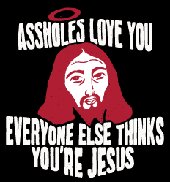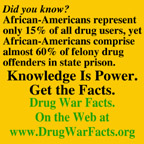|
|
 |
 |
 |
 |
register |
bbs |
search |
rss |
faq |
about
|
 |
 |
meet up |
add to del.icio.us |
digg it
|
 |

|
Making the World Safe for Hypocrisy
MAKING THE WORLD SAFE FOR HYPOCRISY
by Michael Parenti
Among the hypocritical crusades fabricated by U.S. leaders is the "war on
drugs." On Pacifica Radio (October 31, 1990), a spokesperson from Americas
Watch described how the United States was giving funds to military and
paramilitary groups in Colombia ostensibly to fight drug trafficking.
Instead, these forces were devoting their efforts to torturing and killing
members of the legal Left, those working for social reform and peaceful
electoral challenge. The Americas Watch representative concluded that
"unfortunately" U.S. policy "is in error." In its "haste" to fight the war
on drugs, Washington was "giving money to the wrong people."
Actually, the administration was giving money to the people who were
putting it exactly to the use Washington desired. Like so many policy
critics, the Americas Watch spokesperson assumed that U.S. leaders were
misguided when in fact they were misguiding us. As in Colombia, so in Peru:
under the guise of fighting the drug traffic, U.S. forces and funds have
been used to train and equip Peruvian troops, who have been put to
merciless use not against drug dealers but against political insurgents.
Likewise, the White House would have us believe that the purpose of the
1989 invasion of Panama was to apprehend President Manuel Noriega, because
he had dealt in drugs and was therefore in violation of U.S. laws. Here
Washington operated under the remarkable principle that its domestic laws
had jurisdiction over what the heads of foreign nations did in their own
countries. Were that rule to work both ways, a U.S. president could be
seized and transported to an Islamic country to be punished for failing to
observe its laws.
U.S. forces did more than go after Noriega. They bombed and forcibly
evacuated working class neighborhoods in Panama City that were pro-Noriega
strongholds. They arrested thousands of officials, political activists, and
journalists, and purged the labor unions and universities of anyone of
leftist orientation. They installed a government headed by rich compradors,
such as President Guillermo Endara, who were linked to companies, banks,
and individuals deeply involved in drug operations and the laundering of
drug money.
The amount of narcotics that came through Panama represented but a small
portion of the total flow into the United States. The real problem with
Panama was that it was a populist nationalist government. The Panamanian
Defense Force was a left-oriented military. General Omar Torrijos,
Noriega's predecessor who was killed in a mysterious plane explosion that
many blame on the CIA, initiated a number of egalitarian social programs.
The Torrijos government also negotiated a Canal treaty that was not to the
liking of U.S. rightwingers. And Panama maintained friendly relations with
Cuba and Sandinista Nicaragua. Noriega had preserved most of Torrijos'
reforms.
After the U.S. invasion, unemployment in Panama soared; the public sector
was cut drastically; and pension rights and other work benefits were
abolished. Today Panama is once more a client-state nation, in the iron
embrace of the U.S. global corporate system with a desperately impoverished
population willing to work harder for less,
Which Side Are You On, Boys?
The U.S. national security state has done nothing to stop the international
drug trade and much to assist it. Some people quip that "CIA" stands for
"Capitalism's International Army." Others say it stands for "Cocaine Import
Agency." In Laos in the early 1960s, the agency lived up to both names. The
CIA's biggest asset in recruiting the Meo tribes into an army to fight
against the anti-imperialist, anti-capitalist Pathet Lao was its ability to
transport the Meo's big cash crop of opium out of remote villages onto
major markets via Air America, a CIA-operated airline.
When this story became public, the CIA admitted knowing that the Meo were
transporting opium on Air America and claimed it had tried to stop them
from doing it, but, well, it wasn't easy. In fact, CIA pilots subsequently
reported they were under orders from their superiors not to interfere with
the shipments. Opium production by CIA-backed warlords in Southeast Asia
increased tenfold soon after the CIA moved in.
In 1988, witnesses before Senator Kerry's Senate Subcommittee on Terrorism,
Narcotics, and International Operations gave evidence of a massive drug
operation in which CIA and other government personnel were involved, along
with top executive and military leaders of a number of Latin American
countries. CIA operatives were using the funds accumulated from cocaine
trafficking to subsidize counterrevolutionary armies throughout the region
and in some cases were lining their own pockets.
A former intelligence aide to Noriega, Jose Blandon, told the Kerry
Committee that the Costa Rican airstrips used for arms deliveries to the
Nicaraguan contras also carried cocaine shipments to the USA. An official
investigative committee in Costa Rica brought charges against John Hull, an
American rancher who was linked to the CIA and the drug trade. Costa Rican
authorities requested (unsuccessfully) that Hull be extradited, charging
that he had been involved in murder and in smuggling arms and drugs in
their country. Complicit with him, they named Lieutenant Colonel Oliver
North and Rob Owen, former legislative assistant to then Senator Dan Quayle
of Indiana. Hull was also implicated in criminal fraud, obstruction of
justice, and trafficking in this country, yet the Justice Department took
no action against him. Nor was he extradited to Costa Rica. (Both the Kerry
committee report and Independent Counsel Lawrence Walsh's final report on
Iran-contra contain critical evidence establishing North's links to drug
trafficking. Instead of sitting in prison, North ended up running for the
U.S. Senate.)
The Costa Rican indictment against Hull and the charges against North
received almost no attention in the mainstream media, just a few ho hum
lines on an inside page of the New York Times. If a progressive leader like
Jesse Jackson had been linked to the Sandinistas in narcotics and arms
trade, it would have played as a major story for weeks on end. If the war
against drugs is being lost, it is because the national security state is
on the side of the traffickers.
Drugs as a Weapon of Social Control
Besides financing wars and lining pockets, narcotics are useful as an
instrument of social control. As drugs became more plentiful in the United
States, consumption increased dramatically. Demand may create supply, but
supply also creates demand. The first condition for consumption is
availability, getting the product before the public in plentiful amounts.
Forty years ago, inner-city communities were just as impoverished as they
are now, but they were not consuming drugs at the present level because
narcotics were not pouring into them in such abundance and at such
accessible prices as today.
Those who want to legalize marijuana should specify "marijuana" instead of
using the general term "drugs," because to many people drugs means crack,
ice, PCBs, heroin and other hard stuff that has taken a serious toll on
their communities.
A successful international war on drugs would not be impossible if the
United States made a concerted effort, and if it got countries like
Pakistan, Afghanistan, Thailand, Colombia, Peru, and Bolivia to be as tough
on their drug traffickers as they are on their peasants, students, and
workers who struggle for social betterment.
U.S. policy is less concerned with fighting a war against drugs than in
using drugs and drug traffickers in the war for social control at home and
abroad. Like the ex-Nazis who proved useful in the war against communism,
the drug traffickers (some of whom are linked to fascist organizations) are
on the side of the CIA. "For the CIA to target international drug
networks," write Peter Dale Scott and Jonathan Marshall in Cocaine Politics
(1991), "it would have to dismantle prime sources of intelligence,
political leverage, and indirect financing for its Third World operations."
This would be nothing less than "a total change of institutional
direction."
While talking big about fighting drugs, President Reagan cut one-third of
the federal law enforcement funds for fighting organized crime. The Drug
Enforcement Agency was reduced 12 percent, causing the dismissal of 434 DEA
employees, including 211 agents. The Coast Guard was downsized, resulting
in less coastal surveillance of illicit traffic. The U.S. Attorney's staff
was cut drastically, creating a shortage of lawyers and causing the Justice
Department to drop 60 percent of its drug and crime cases. All this moved
crime investigator Dan Moldea to describe the Reagan drug policy as "a
fraud." And Congressman Tom Lewis complained, "We're just arresting ponies,
the little people. Why aren't we getting the big guys?"...
|

|
 |
To the best of our knowledge, the text on this page may be freely reproduced and distributed.
If you have any questions about this, please check out our Copyright Policy.

totse.com certificate signatures
|
 |
 |
About | Advertise | Bad Ideas | Community | Contact Us | Copyright Policy | Drugs | Ego | Erotica
FAQ | Fringe | Link to totse.com | Search | Society | Submissions | Technology
|
 |
 |
 |
 |
|

